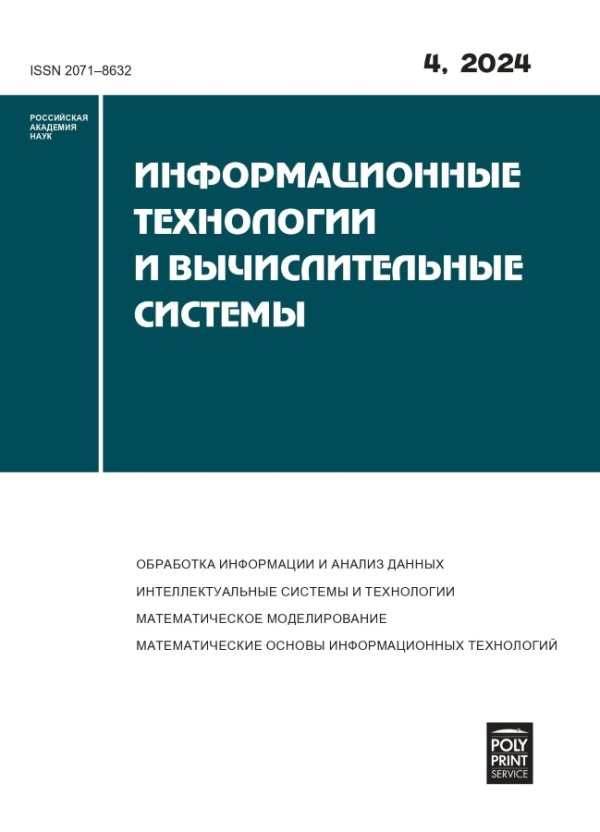Methodological Support of Information Systems in Assessing Reliability
- Authors: Solovyev A.V.1
-
Affiliations:
- Federal Research Center “Computer Science and Control” of the Russian Academy of Sciences
- Issue: No 2 (2024)
- Pages: 15-25
- Section: Information processing and data analysis
- URL: https://ogarev-online.ru/2071-8632/article/view/287994
- DOI: https://doi.org/10.14357/20718632240202
- EDN: https://elibrary.ru/HZUPOR
- ID: 287994
Cite item
Abstract
The article discusses the development of methodological support for assessing the reliability of information systems (IS), as well as assessing the effectiveness of IS application based on the reliability indicator. The advantage of the proposed methodological support is its simplicity, which makes it possible for IS technical personnel to master it. The presented methodological support includes the se- lection of reliability indicators, determination of failures and failures of the IS, development of a reliability scheme, development of a mathematical model for assessing reliability, development of rules for collecting and calculating statistical data, rules for evaluating efficiency. The presented methodological support has been tested within the framework of scientific and methodological support for the modernization of the State Automated System “Elections”, as well as in a number of projects and brought to the current methodology.
About the authors
Alexander V. Solovyev
Federal Research Center “Computer Science and Control” of the Russian Academy of Sciences
Author for correspondence.
Email: soloviev@isa.ru
Chief Researcher, Doctor of Technical Sciences
Russian Federation, MoscowReferences
- GOST 34.003-90. 2009. Information technology. Set of standards for automated systems. Automated systems. Terms and Definitions. Standartinform. 127 p.
- GOST 27.102-2021. 2021. Reliability in technology. object reliability. Terms and Definitions. FGBU "RST". 36 p.
- Kulyagin V.A., Tsarev R.Yu., Kapulin D.V., Pupkov A.N., Kukartsev V.V. 2015. Conceptual model of a multi-stage complex assessment of the reliability of automated enter- prise management systems. Fundamental Research, 7-2: 323-327.
- Krylov E.G. 2018. Assessment of indicators of reliability of automated systems. VolgGTU. Volgograd, 80 p. ISBN 978- 5-9948-2878-6.
- Semenov V.S., Semenov V.V. 2015. Assessment of the re- liability of automated process control systems. Traditions and innovations in construction and architecture. Construc- tion technologies. Samara State University of Architecture and Civil Engineering. Samara: 416-419.
- Kulyagin V.A. 2012. Model for assessing the reliability of automated enterprise management systems based on statis- tical probabilistic components. Bulletin of the Siberian State Aerospace University. Academician M.F. Reshetnev, 3(43): 33-37.
- Kulyagin V.A. 2012. Analysis of the application of the model for assessing the reliability of automated enterprise management systems. Bulletin of the Siberian State Aerospace University. Academician M.F. Reshetnev, 5(45): 65-70.
- Osnovina O.N., Fighting L.M. 2015. Approach to assessing the economically viable level of reliability of automated controsystems. Modern problems of the mining and met- allurgical complex. Science and production. Materials of the Twelfth All-Russian Scientific and Practical Confer- ence, with international participation: 230.
- Bulatov V.V. 2021 Assessment of the reliability of auto- mated systems during operation. Industrial ACS and controllers, 6: 3-7.
- Samokhvalov A.A., Slabukha V.N., Taranov A.I. 2022. Multi- level assessment of the reliability of communication technology and automated control systems based on the results of tests at the operational stage. Problems of technical support of troops in modern conditions. Proceedings of the VII interuniversity scientific-practical conference: 237-245.
- Borisov V.M., Borisov S.V. 2012. Method of collecting in- formation for assessing the experimental reliability of compressor and refrigeration machines. Bulletin of Kazan Tech- nological University, 15 (10): 222-225.
- Drovnikova I.G., Rogozin E.A., Etepnev A.S. 2020. A soft- ware and methodological complex for assessing the indicators of reliability and functioning of information protection systems from unauthorized access to automated systems. Public safety, law and order in the III millennium, 6-2: 225-231.
- Semyonov V.S. 2015. Assessment of the reliability of auto- matic and automated control systems. Bulletin of the Samara State Technical University, 2 (46): 42-47.
- Klimanov V.P., Ermakov A.A., Sutyagin M.V. 2008. Com- prehensive assessment of the reliability of software and hardware components of an automated information system in mechanical engineering. Bulletin of MSTU "Stankin", 4: 135-141.
- Osnovina O.N., Boeva L.M., Simonov A.G. 2014. Assess- ment of the effectiveness of automated control systems, tak- ing into account indicators of operational reliability. Con- trol systems and information technologies, 1(55): 56-60.
- Batkovsky A.M. 2017. Assessment of the technical reliability of automated control systems at defense industry enterprises. New Science: Strategies and Vectors of Develop- ment, 1(2): 138-140.
- Zorin E.F., Ryzhov B.S., Kiselev V.V. 2015. Methodology for assessing the impact of redundancy on the reliability characteristics of informatization tools for automated mili- tary systems. Dual technologies, 1(70): 59-62.
- Batkovsky M.A. 2016. Assessment of the reliability of au- tomated control systems in the military-industrial complex. New Science: From Idea to Result, 1(1): 50-52.
- Butakova M.A., Guda A.N., Gnadenberg V.S. 2011. Meth- ods for assessing the reliability and technological safety of the control software for automated control systems in rail- way transport. Bulletin of the Rostov State University of Communications, 3(43): 22-32.
- Repin S.I. 2021. Assessing the quality of software for auto- mated systems based on a single-stage test plan. I-methods, 13 (1).
- Tyncherov K.T. 2011. Assessment of the reliability of a mod- ular neuroprocessor of automated process control systems. Bulletin of the Moscow Aviation Institute, 18 (3): 219.
- GOST 27.507-2015. 2016. Reliability in technology. Spare parts, tools and accessories. Valuation and calculation of reserves. Standartinform, 52 p.
- Akimova G.P., Solovyev A.V., Tarkhanov I.A. 2018. Reli- ability Assessment Method for Geographically Distributed Information Systems. The IEEE 12th International Confer- ence on Application of Information and Communication Technologies (AICT 2018, 17-19 Oct. 2018, Almaty, Ka- zakhstan), IEEE: 188-191. doi: 10.1109/ICAICT.2018.8747055.
Supplementary files










